Stop All War Funding
• Demand Congress Stop All War Funding! Stop U.S. Killings and Displacement of Civilians!
• IVAW Demonstrates Against War Funding
• Get Out of Iraq, Get Out Afghanistan, Come Home, America • War Funding:Appearance of Reductions Hide Reality of More War
• President Obama's War Budget Afghanistan and Pakistan: Stop Killings and Displacement of Civilians
• Pragmatism: A Philosophy of Monopoly Capitalism, Fascism and War
• Obama, Pakistan, and the Rule of Law — • The Drones Are Coming: New War on Civilians —
Afghanistan and Pakistan
Demand Congress Stop All War Funding!
Stop U.S. Killings and Displacement of Civilians!
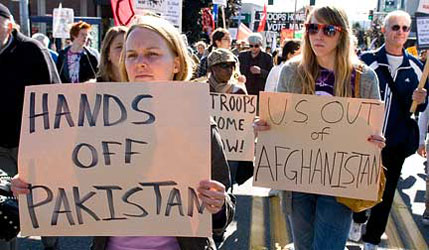
![]()
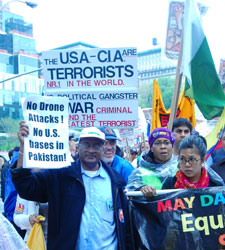
Voice of Revolution vehemently denounces the war crimes committed by the U.S. imperialists in the wanton destruction, mass killing and displacement of civilians in Afghanistan and Pakistan. Using the high ideals of U.S. “national security” and “security and stability” for the region and the world, the U.S. is massacring civilians while also demanding that Pakistan do the same. On May 1, General Petraeus, who heads U.S. Central Command, said the first two weeks of May would be “critical to determining whether the Pakistani government will survive.” He said if Pakistan did not follow U.S. dictate and pursue attacks to “eliminate the Taliban threat,” then the U.S. would have to decide on the “next course of action.” Massacres and massive displacement of civilians, by U.S. drones and the Pakistani military followed.
On May 4, at least 140 civilians were killed by two U.S. air strikes in the Farah province of western Afghanistan, the worst such incident to come to light thus far. In neighboring Pakistan, operations by that country’s military against “Taliban insurgents” in the Swat Valley have created some one million internal refugees in recent months, with the government determined to continue regardless of the human consequences.
These brutal crimes, committed by the Barack Obama administration, do not represent “change” but the worst retrogression and overturning of established norms and international rule of law. They echo the brutality of the U.S/Israeli attacks on Gaza, where more than 1000 people were killed, 80 percent of them civilians, including 300 children. More than 14,000 homes were destroyed, as were hospitals, schools, government buildings, sewer and electric facilities. It is U.S. imperialism and its war drive for world domination that is the source and cause of these crimes.
And now President Barack Obama has requested yet more war funds, and Congress is providing them. After emphasizing when he presented his budget for 2010 that war funding would be included in the Pentagon budget rather than supplemental bills, saying this was necessary for “transparency,” Obama has now requested $75.8 billion in supplemental funding. This is in addition to the Pentagon’s more than $515 billion, including hundreds of billions for the wars. And he has emphasized that U.S. aggresison will continue. Speaking May 6 following meetings with President Karzai of Afghanistan and Presidet Zardari of Pakistan, Obama said, "Along the border [between Afghanistan and Pakistan] where insurgents often move freely, we must work together with a renewed sense of partnership to share intelligence, and to coordinate our efforts to isolate, target and take out our common enemy."
Congress has responded to obama's demands but providing more funds than he requested. The House passed a bill for $96.7 billion in supplemental funding for the wars, by a 368-60 vote. The Senate is considering a nearly identical bill and will likely vote next week. Congressional leaders have promised Obama will have the bill on his desk by Memorial Day.
The funds are generally not restricted, meaning the Pentagon can spend them as it sees fit. The bills also continue the chauvinist stand of the U.S. that it can decide the internal affairs of other countries, require them to commit aggression “or else,” refuse to recognize political parties and elected governments, and so on. For example, the bill requires Obama to report in February 2010 whether the Afghanistani and Pakistani governments are “demonstrating the necessary commitment, capability, conduct and unity of purpose,” to meet U.S. demands. This must include data on “thwarting counterinsurgency operations.” The funds specifically include funding for an entirely new Pakistan Counterinsurgency Capability Fund to carry on the current operations killing thousands and displacing hundreds of thousands.
The people of the U.S. have made clear that they want the wars in Iraq and Afghanistan ended now and they want an end to U.S. aggression. This is reflected in the demand to Bring All Troops Home Now and banners for Mother’s Day actions, Not One More Death, No Mother’s Child Killed. May Day actions also demanded funding for rights, not for war.
Americans stand with the world’s peoples in rejecting Might Makes Right, where through force of arms the imperialists, led by the U.S., attempt to negate the peoples’ right to be. The U.S. military regularly attempts to end peoples' very existence by reducing them to an afterthought of “collateral damage,” and a "necessary consequence," for military commanders to be free to conduct operations.
The imperialist conception of establishing “security and stability” is simply another way of saying “you are either with us, or with the terrorists.” We say No! Step up the fight to Bring All Troops Home Now! Stop All War Funding Now! Get Out of Iraq, Afghanistan and Pakistan, Now!

![]()

[TOP]
IVAW Demonstrates Against War Funding
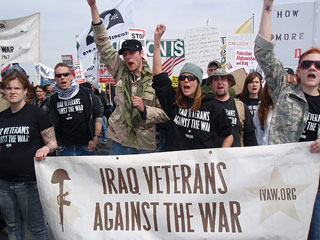 Members of Congress will be voting on supplemental war funding to continue military occupations in Iraq and Afghanistan May 14 and 15. Iraq Veterans Against the War (IVAW) member and Marine Corporal Rick Reyes testified in front of the Senate Foreign Relations Committee in April about why it is a grave mistake to escalate in Afghanistan. This week, he and other IVAW members who have served in both conflicts are in Washington, D.C. talking to their representatives about why both occupations must end — now. Working in a special collaboration with Brave New Foundation’s Rethink Afghanistan campaign, IVAW members are calling on Congress to vote No on a $96.7 billion supplemental war spending bill that will continue military operations in Afghanistan and Iraq. A demonstration was organized May 14 in front of the Capitol building.
Members of Congress will be voting on supplemental war funding to continue military occupations in Iraq and Afghanistan May 14 and 15. Iraq Veterans Against the War (IVAW) member and Marine Corporal Rick Reyes testified in front of the Senate Foreign Relations Committee in April about why it is a grave mistake to escalate in Afghanistan. This week, he and other IVAW members who have served in both conflicts are in Washington, D.C. talking to their representatives about why both occupations must end — now. Working in a special collaboration with Brave New Foundation’s Rethink Afghanistan campaign, IVAW members are calling on Congress to vote No on a $96.7 billion supplemental war spending bill that will continue military operations in Afghanistan and Iraq. A demonstration was organized May 14 in front of the Capitol building.
IVAW members voted in January on a resolution condemning the occupation of Afghanistan. Consistent with our position, we cannot allow Congress to continue funding these wars.
Additional war funding is a huge mistake. More war funding means continued multiple deployments for an exhausted military, which means more combat stress and PTSD harming our veterans and their families.
Escalating in Afghanistan means more civilian deaths at a time when Afghan President Karzai has demanded an end to U.S. air strikes that kill and maim Afghan families.
President Obama promised no more war funding through supplementals that are not part of the federal budget and that hide the real cost of these wars.
We should be funding job creation for veterans and others suffering in a poor economy at home rather than more taxpayer money for wasteful conflicts abroad.
Urge your representatives in Congress to vote No on a $96.7 billion supplemental wartime spending bill!
[TOP]
Speaking in Congress on a Supplemental Appropriations bill that would continue to fund the wars in Iraq and Afghanistan, Congressman Dennis Kucinich (D-OH) today made the following statement:
“America went to war against Iraq based on a lie. We were told back in 2002 that Iraq had weapons of mass destruction. The previous administration even pursued torture to try to extract false confessions in order to justify the war. It is time to tell the truth. The truth is we should not have prosecuted a war against the Iraqi people. The truth is the Democratic Senate could have stopped the Iraq war in 2002. The truth is we Democrats were given control of Congress in 2006 to end the war. The truth is this bill continues a disastrous war, which has cost the lives of thousands of our soldiers. The truth is the occupation has fueled the insurgency. The truth is the Iraq war will cost the American and the Iraqi people trillions of dollars and as many as a million innocent Iraqis have lost their lives as a result of this war.
“Don’t tell the American people that you are ending the war by continuing to fund the war. Don’t tell the American people that the war will end when their plans leave 50, 000 troops in Iraq. Don’t tell the American people that the way out of Afghanistan is to escalate our presence.
“Get out of Iraq. Get out Afghanistan. Come home America.”
[TOP]
War Funding
Appearance of Reductions Hide Reality of More War
President Barack Obama has called for an additional $75.8 billion in war funds for this fiscal year. The House has passed a bill for $96.7 billion and the Senate is debating a similar bill. This means supplemental war funding will be $145-$165 billion for fiscal year 2009 (October 1, 2008-September 20, 2009). These funds are in addition to the Pentagon’s more than $515 billion for 2009.
1) Personnel costs for the Army Reserve and Army National Guard increase by $1.1 billion in 2009. The “reduction” being claimed, of $1.4 billion, is for “Active Overstrength” costs. This category refers to the number of soldiers covered by the supplemental funding instead of Pentagon funding. The “reduction” is in fact simply a change in accounting, with Pentagon funding now covering the soldiers instead of supplemental funds.
2) The U.S. will spend $84.2 billion on the Operation & Maintenance budget, essentially the same as the $84 billion spent in 2008. This compares to the $75 billion spent in 2007; the $60 billion spent in 2006; and the $48 billion spent in 2005. Funding for “Operation and Maintenance - Defense Wide” increases by $2.5 billion in 2009. This includes funding for the U.S. Special Operations Command (SOCOM) and for the Defense Security Cooperation Agency (DSCA). The funding decline of $1.9 billion involves funding for training of Iraqi forces.
3) Funding for the Afghanistan war will increase to $46.9 billion in 2009, a 31 percent increase over the $35.9 billion in 2008 and the $32.6 billion in 2007.
Spending on the Afghanistan Security Forces Fund and the new Pakistan Counterinsurgency Capability Fund account for a $3.3 billion increase in war funds.
[TOP]
President Obama's War Budget
President Barack Obama's 2009 supplemental spending request of $75.8 billion to fund the wars in Iraq and Afghanistan is currently before Congress. The objective in Congress is] to have the bill finalized and to Obama for signature by Memorial Day. [The House passed its version of the bill, for $97 billion May 14. The Senate is debating a similar measure, also for an increased amount. ]
President Obama is seeking an additional $75.8 billion in war funds for this fiscal year. If Congress enacts Obama's request, total supplemental war funds will come to $144.6 billion for Fiscal Year 2009 (which ends on September 30, with Fiscal Year 2010 beginning on October 1). This compares to the $186 billion war spending in 2008. Obama's proposed war budget for 2010 is $130 billion.
At first glance, it is easy to conclude that the proposed 22 percent reduction in war spending from 2008 to 2009 represents a significant shift in war strategy and is indicative of a drawing down of the twin wars in Iraq and Afghanistan. Such a conclusion would be wrong.
What follows is a discussion of the three main components of the war budget: Personnel costs; Operation & Maintenance costs; and Procurement costs. This discussion is based on data and material produced by the Department of Defense Comptroller; the Congressional Research Service; the budget justification materials of the branches of the military; and the Fiscal Year 2009 Bridge Fund appropriations passed by Congress last June.
This discussion includes total supplemental war funding for 2009, including both that amount appropriated by the Democrat-controlled Congress last June and the amount being requested by Obama in the currently pending supplemental spending request. It should be noted that the war funds approved by Congress last year were contained in the bill crafted by the Democratic Party leadership. [These funds are in addition to the Pentagon budget of more than $515 billion.]
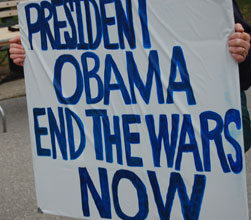 It should also be noted that while funding levels are reduced from 2008 to 2009, in each of the three categories, President Obama is in fact seeking new funding to the tune of $75.8 billion. That said, Personnel costs are reduced by $1.7 billion in 2009. Operation & Maintenance costs are reduced by $1.9 billion. Procurement costs are reduced by $37 billion. Even so, a closer look at the numbers behind the numbers reveals that the reductions are not as significant as they may appear at first glance.
It should also be noted that while funding levels are reduced from 2008 to 2009, in each of the three categories, President Obama is in fact seeking new funding to the tune of $75.8 billion. That said, Personnel costs are reduced by $1.7 billion in 2009. Operation & Maintenance costs are reduced by $1.9 billion. Procurement costs are reduced by $37 billion. Even so, a closer look at the numbers behind the numbers reveals that the reductions are not as significant as they may appear at first glance.
Personnel Costs
Personnel costs will decline by $1.8 billion in 2009. The Army, Air Force, and Marine Corps will all reduce personnel costs. A portion of these cost reductions will be offset by small increases in Personnel costs for the Navy as well as for the Marine Corps Reserve and for the Reserve and National Guard components of the Army and Air Force.
The Army's personnel costs will drop by $2 billion, declining from $13 billion in 2008 to $11 billion in 2009. While this is a 15 percent decline, it also illustrates that all is not as it seems when reviewing top line budget numbers.
Two significant factors account for nearly all the reduction in the Army's personnel costs, neither of which is related to the Iraq and Afghanistan war effort. "Active Overstrength" costs are reduced by $1.4 billion and "Recruiting and Retention" costs are reduced by $0.8 billion.
"Active Overstrength" refers to the number of soldiers in the Army over-and- above the number provided for by Congress in the regular baseline Department of Defense budget. In 2008, Active Overstrength consisted of 43,632 soldiers. This declines to 15,658 soldiers in 2009. All this means — and all the $1.4 billion reduction in associated costs means — is that the soldiers' pay of 27,974 soldiers is now included in the baseline budget of the Army rather than being included in the supplemental spending bills.
Meanwhile, personnel costs for the Army Reserve and Army National Guard increase by $1.1 billion in 2009, reflecting the increased number of Reserve and Guard units being deployed to one of the two wars.
The Army's reduction in "Recruitment and Retention" costs is perhaps best explained by the current economic depression and the lack of other job opportunities.
Operation & Maintenance
Operation & Maintenance (O&M) funds decline by $1.9 billion in 2009 (down to $91.6 billion compared to $93.5 billion in 2008). This category contains funds for U.S. military operations. It also contains funds for the training and development of the military and police forces in Iraq and Afghanistan. As fate should have it, it is a decline in funding for Iraq's military and police forces that results in the cost reduction in 2009.
Of the U.S. military services, only the Air Force receives a slight increase in Operation & Maintenance funding this year, increasing by $0.5 billion. The Army's O&M budget is reduced by $1 billion; the Army National Guard by $0.5 billion; the Navy by $0.8 billion; and the Marine Corps by $0.1 billion. The Air Force Reserve and Air National Guard together will receive $0.4 billion less in O & M funds (thus offsetting the slight increase in the Air Force budget).
Notably, funding for "Operation and Maintenance - Defense Wide" increases by $2.5 billion in 2009 (up to $8.3 billion from the $5.8 billion n 2008). Funding for the U.S. Special Operations Command (SOCOM) is included in this category, as is funding for the Defense Security Cooperation Agency (DSCA). If Obama's supplemental spending request is approved by Congress, total funding for SOCOM will be $2.4 billion in 2009 and for the DSCA, $1.7 billion.
Overall, the Operation & Maintenance funding for U.S. military forces comes out essentially the same this year-$84.2 billion in 2009 compared to $84 billion in 2008.
The cost savings in the overall Operation & Maintenance budget is to be found in those funds designated for the development and training of Iraq's military and police forces. President Obama seeks no additional funds for the Iraq Security Forces Fund and only an additional $415 million for the Iraq Freedom Fund. In 2009, funding for the Iraq Security Forces Fund is cut by $2 billion and for the Iraq Freedom Fund by $3.4 billion-for a total cut in funding of $5.4 billion.
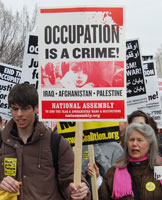 Resources are shifted to the Afghanistan Security Forces Fund, which will be increased by $2.9 billion (to a total of $5.6 billion in 2009). An entirely new Pakistan Counterinsurgency Capability Fund is created with Obama's supplemental and will initially be funded with $400 million for this fiscal year (which notably ends on September 30). Spending on the Afghanistan Security Forces Fund and the Pakistan Counterinsurgency Capability Fund account for a $3.3 billion increase in war funds.
Resources are shifted to the Afghanistan Security Forces Fund, which will be increased by $2.9 billion (to a total of $5.6 billion in 2009). An entirely new Pakistan Counterinsurgency Capability Fund is created with Obama's supplemental and will initially be funded with $400 million for this fiscal year (which notably ends on September 30). Spending on the Afghanistan Security Forces Fund and the Pakistan Counterinsurgency Capability Fund account for a $3.3 billion increase in war funds.
So what is left after all of the cost shifts discussed above? The U.S. will spend $84.2 billion on the Operation & Maintenance budget of its own military in 2009-essentially the same as the $84 billion spent in 2008. This compares to the $75 billion spent in 2007; the $60 billion spent in 2006; and the $48 billion spent in 2005. The Operation and Maintenance numbers in Obama's war budget do not provide significant evidence of a significant shift in the overall strategy for the wars in Iraq and Afghanistan.
Procurement
Procurement funding drops by $36.9 billion in 2009 — from $64.9 billion in 2008 to $28 billion in 2009. Yet it would be inaccurate to conclude that this 57 percent reduction in procurement funding represents a truly significant shift in funding for the Iraq and Afghanistan wars. The $28 billion funding level still remains well above the $22.9 billion appropriated in 2006 and the $18 billion appropriated in 2005. Indeed, of the $28 billion in total 2009 funding, $21.9 billion is contained within the supplemental spending request submitted by Obama — in and of itself still above funding levels in 2005 and on a par with 2006.
Significantly, the year 2006 provides one explanation for the reduction in procurement funds in 2009 when compared to 2008 and 2007. In October 2006, Deputy Secretary of Defense Gordon England greatly expanded the parameters on the type of procurement spending that could be included in emergency supplemental spending requests. Prior to October 2006, the DOD financial regulations aimed to limit requests for supplemental spending requests to only cover the incremental costs of the two wars. In simple form, this meant that if a Stryker fighting vehicle is destroyed in Iraq then the Army could request a new Stryker as a replacement. The Air Force could replace Joint Direct Attack Munitions expended in the Iraq and Afghanistan wars. Used ammunition could be replenished. Yet even with this limitation in place, the Congressional Research Service and others questioned whether many of the items acquired by the military through the supplemental process were indeed incremental costs of war to replace lost equipment — or whether at least some portion of the procurement monies was being used to upgrade existing equipment previously scheduled for upgrade, to acquire new equipment for the new modular structure of the Army, and to buy next generation weapons systems (each of which should have been funded through the regular baseline Department of Defense budget).
In October 2006, England directed the military to submit spending requests to not only cover the incremental costs of the wars in Iraq and Afghanistan, but also to include any new costs attributed to the so-called "long war on terror."
Procurement appropriations exploded, jumping from $22.9 billion in 2006 (the fiscal year immediately prior to England's directive) to $45.4 billion in 2007 (the first fiscal year under the new directive), and then to $64.9 billion in 2008.
Thus, it is likely that the reduction in Procurement monies to be appropriated in 2009 simply reflects a reversal of England's directive, with a shift back to a more normative budgetary process which seeks to limit new "emergency" procurement requests to those incremental costs directly related to the wars in Iraq and Afghanistan, rather than being reflective of significant shifts in the direction of the overall war strategy.
It is also possible that the reduction in procurement monies in 2009 reflects that previously appropriated procurement funds still remain available to be spent. Normally when Congress appropriates funds, those funds must be spent in that fiscal year or be lost. However, procurement monies remain available to be spent for up to three years after being appropriated by Congress. This often results in procurement funds being carried over from one fiscal year to the next. According to the Congressional Research Service, as of October 1, 2007, the Department of Defense carried over $45 billion in war justified procurement appropriations into the new fiscal year.
The sharp reduction in procurement funds in 2009 may also be a result of the prior front-loading of procurement requests by the military. That is to say, in 2007 and 2008 the Department of Defense may well have requested surplus procurement funds as a buffer against future reductions in procurement funds. The Congressional Research Service notes that: "The FY 2007 and FY 2008 war requests both appear to include an extra year of Army and Marine Corps reset requirements. According to statements by Army Chief of Staff, General Peter J. Schoomaker and other military spokesman, Army reset is estimated to be $12 billion to $13 billion a year as long as the conflict lasts at the current level and ‘for a minimum of two to three years beyond.'"
With the passage of Obama's war supplemental, the Army will be slated to receive a total of $13.5 billion in procurement funds in 2009 — essentially what General Schoomaker projected. So again, the question arises: does President Obama's war budget for 2009 reflect a potentially significant shift in war strategy or does it merely reflect a return to a more normative budget pattern?
Last, as regards procurement, it ought to be noted that fully one-third of the reduction in 2009 Procurement funds will be the result of a $12.4 billion reduction in funding for the Mine Resistant Ambush Protected (MRAP) vehicles. In 2008, Congress appropriated $16.8 billion to rapidly acquire and deploy MRAPs for use in Iraq. In 2009, the $4.4 billion is included in total spending for a new version of MRAPs to be designed and produced for use in the different terrain and environment of Afghanistan.
The Afghanistan - Pakistan War
Obama's 2009 war budget sheds light on the expansion of the war in Afghanistan and Pakistan. While overly broad conclusions perhaps should not be drawn from the available data, the trends are indeed troubling.
In its summary "Fiscal Year 2009 Supplemental Request" the Department of Defense states that funding for the Afghanistan war will increase to $46.9 billion in 2009, a 31 percent increase over the $35.9 billion in 2008 and the $32.6 billion in 2007.
This $11.3 billion increase includes an additional $2.8 billion for the Afghanistan Security Forces Fund; $400 million for the Pakistan Counterinsurgency Capability Fund; and $4.4 billion for MRAPs designed for use in Afghanistan. Increased troop levels will also account for a portion of the increase.
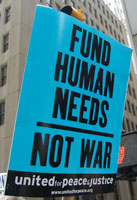 Military construction projects in Afghanistan are expanded under Obama's war budget. In the 2009 supplemental now before Congress, Obama seeks an additional $620 million to fund Army construction projects and $240 million to fund Air Force construction projects. The Army projects include construction and upgrade of air facilities at various bases to accommodate the CH-47 Chinook helicopters and to construct additional troop housing to accommodate the increased troop levels.
Military construction projects in Afghanistan are expanded under Obama's war budget. In the 2009 supplemental now before Congress, Obama seeks an additional $620 million to fund Army construction projects and $240 million to fund Air Force construction projects. The Army projects include construction and upgrade of air facilities at various bases to accommodate the CH-47 Chinook helicopters and to construct additional troop housing to accommodate the increased troop levels.
The supplemental spending request also points towards the increased use of the MQ-1 Predator and the MQ-9 Reaper drones in the war. Obama seeks $57.4 million to acquire 742 Predator Hellfire missiles and $196 million for ten new MQ-9 Reapers.
Funding is included to upgrade the MQ-1 and MQ-9 systems in order that a second remote split operations site can be established to control the drones. This second site is necessary since the current site is reaching its operational capacity for the control of the increasing drone flights. As noted in the justification materials submitted by the Air Force: "Both Predator and MQ-9 Reaper conduct their missions through ‘Remote Split Operations' whereby a minimum number of operators and maintenance personnel are deployed forward for launch and recovery of the aircraft. After launch, the aircraft is ‘handed-off' to CONUS-based mission crews for actual mission prosecution. For this mode of operations, the command and control and full motion video (FMV) is currently relayed through a single forward communications site. This site is nearing capacity with the current increase in Predator operational tempo...This project procures satellite terminals and video dissemination equipment to establish a second remote split operations relay site."
What the Future May Hold
President Obama is seeking $130 billion to fund the Iraq and Afghanistan wars in his budget request for 2010. This is a mere $14 billion less than overall funding in 2009.
Our work to end the wars in Iraq and Afghanistan is really just beginning anew. We should not allow ourselves to be deceived into believing that a shift in war strategy and policy is underway simply because of a reduction in particular appropriations for the war. The top dollar line is itself deceiving.
Source Material:
• “The Cost of Iraq, Afghanistan, and Other Global War on Terror Operations Since 9/11” (Updated October 15, 2008), Congressional Research Service. By Amy Belasco (Specialist in U.S. Defense Policy and Budget Foreign Affairs, Defense, and Trade Division). Available at: http://www.fas.org/sgp/crs/natsec/RL33110.pdf
U.S. Department of Defense. Fiscal Year 2009 Supplemental Request.
Summary Justification Material. April 2009. Available at: http://www.defenselink.mil/comptroller/defbudget/fy2009/Supplemental/FY2009; SupplementalRequest/pdfs/FY2009SupplementalRequest04-08-09.pdf
Office of the Secretary of Defense. “Fiscal Year (FY) 2009
Supplemental Request. Exhibits for FY 2009. Military Personnel. Operation and Maintenance. Procurement. Research, Development, Test and Evaluation. Military Construction. Revolving and Management Funds” (April 2009). Available at: http://www.defenselink.mil/comptroller/Budget2009.html
Fiscal Year 2009 Justification Materials produced by each branch of the military are available on-line at:
Army, http://www.asafm.army.mil/budget/fybm/fybm.asp#sup
Air Force, http://www.saffm.hq.af.mil/budget/
Navy and Marine Corps, http://www.finance.hq.navy.mil/fmb/09pres/supplemental/FY2009OverseasConOpsSup.pdf
Public Law 110-252 - June 30, 2008.
Available at: http://thomas.loc.gov/cgibin/toGPObss
http://frwebgate.access.gpo.gov/cgibin/getdoc.cgi?dbname=110congpublic_laws&docid=f:publ252.110.pdf
[TOP]
Pragmatism: A Philosophy of Monopoly Capitalism, Fascism and War
Speaking to Al Jazeera television on April 13, Said Jawad, the Afghan ambassador to the United States, said, “civilian casualties during U.S. military operations are a price that we have to pay if the Taliban and al-Qaeda are to be defeated. [Civilian deaths] could be necessary if fighters were to be defeated in Afghanistan, Pakistan and beyond. This is a price that we have to pay if we want security and stability in Afghanistan, the region and the world.”
U.S. military operations in Afghanistan, Pakistan and Iraq resulting in the deaths of civilians have become routine. The expedient rationale that civilian casualties are “the price we pay,” for “security and stability” stated by President Barack Obama and here repeated by Ambassador Jawad has become a familiar mantra of the imperialists. It is the same excuse now being given by Obama to justify re-starting the unjust “military commissions” for the hundreds of people, most civilians, branded as “illegal enemy combatants.”
The philosophical justification that the “end justifies the means” is found in pragmatism, which seeks to negate principles, rules and laws by which people conduct their relations with other humans and nature. Pragmatism arose as an intellectual weapon in the nineteenth century to negate the varied ancient philosophies of colonized people. Pragmatism in concert with missionaries and European chauvinism sought to explain as necessary and progressive the colonization of the Americas, Asia and Africa. Even if colonization resulted in genocide, this was the “price that has to be paid” as Ambassador Jawad says for “security and stability” and the progressive march of humanity against the “backwardness” of the colonized peoples.
 Pragmatism in essence is the absence of principles and rules governing relations among humans and with nature. It represents an attempt to render philosophically the anti-human factor/anti-social consciousness of the European medieval dark ages where principles and rules were negated under the diktat of “might makes right.”
Pragmatism in essence is the absence of principles and rules governing relations among humans and with nature. It represents an attempt to render philosophically the anti-human factor/anti-social consciousness of the European medieval dark ages where principles and rules were negated under the diktat of “might makes right.”
The German Nazi Party combined pragmatism with chauvinism and weapons of mass destruction. The horrific results were displayed for all to see in the slaughter of civilians during the Spanish Civil War, where Franco/German fascism waged war to re-establish the rule of the medieval inquisition. Picasso’s painting Guernica graphically depicts civilian casualties on April 26, 1937, during German military operations in Spain using mainly the air power of twenty-eight German bombers to disastrous effect.
Civilian causalities during the wars of the twentieth century became increasingly routine culminating in the U.S. nuclear bombing of Hiroshima and Nagasaki in 1945 killing hundreds of thousands during only two days of warfare. This war crime was excused pragmatically as a means to end the war and thus “save” American lives. This same notion is heard today to justify the use of torture — outlawed by international law and principles of relations between nations and among humans.
Torture and massacres of civilians were outlawed stemming from the experience of humanity withy the German atrocities upon invading the Soviet Union, the Japanese wanton destruction in Korea and China, the British bombing of Dresden and the U.S. fire and nuclear bombing of Japanese cities. These crimes seared into the consciousness of humanity that something must be done to bring principles into play in human relations that are codified in enforceable international rules and laws. Foremost was the principle that modern weapons of mass destruction, especially from air power, have become so devastating against civilian populations that war must be outlawed and peaceful diplomatic means must be used to settle differences among states.
The profound sentiment of humanity against war following WWII was codified in international laws and the Geneva Convention. Even doing propaganda for war and aggression were outlawed as crimes against the peace. But imperialism, led by U.S. imperialism, has not accepted this verdict paid in people’s blood. U.S. pragmatism considers national security above any principles governing human relations or international law. This unprincipled position has repeatedly resulted in U.S. wars of aggression since WWII starting with its brutal war and occupation of the Korean Peninsula, against Vietnam, its continued colonization of Puerto Rico and most recently against Iraq and Afghanistan. Under the banner of NATO, the United States is waging war in Afghanistan and Pakistan, has and continues to torture prisoners inside and outside the country, carries out rendition to torture, incarceration without trial, interference in the affairs of sovereign nations and spouts a military doctrine of preventative war, all of which are crimes against humanity.
Pragmatism is also an economic philosophy of monopoly capitalism. It could be referred to as a philosophy of the bottom line. More generally, pragmatism underpins the basic motivation of monopoly capitalism that no economic activity must take place unless it expands private wealth in the form of capital. The pragmatic approach to economics and the egocentric motivation of owners of monopoly capital unleash uncontrolled development without concern for the social and natural consequence yet conversely, as people see during this economic crisis with the destruction of manufacturing, block any economic activity that does not expand capital.
Pragmatism negates principles of humanity including the most basic principle that people have rights by virtue of being human. The working class and its allies are in the forefront of struggle to have this principle given a constitutional guarantee. For this to become a reality, the working class must organize itself as an effective social force to overcome the authority of pragmatism and the motive of monopoly capitalism and bring the human factor/social consciousness into the center of economics and politics.
Americans must unite in opposition to the attack on the principles governing relations among humans and the rule of international law especially the most basic law outlawing war and threats of war. The chauvinism of U.S. imperialism and its effort to use the claim of “saving American lives” and “keeping America secure,” to justify its crimes must be rejected. This is the growing spirit in the anti-war movement, expressed in slogans such as “Not one more death, no mother’s child killed.”
To bring the authority in the U.S. into harmony with modern conditions and principles the people must build momentum toward an anti-war government, including running anti-war candidates in the coming elections. An anti-war government would immediately bring all U.S. troops home, pay reparations for all U.S. crimes, cancel the debts of African, Asia and Latin America. It would stand against war and occupation, including ending the colonization of Puerto Rico, ending all support for Israel and defending the rights of Palestine.
An important aspect of the struggle against imperialism and war is rejecting pragmatism and other ideologies of monopoly capitalism, fascism and war.
[TOP]
Obama, Pakistan, and the Rule of Law
“Our Founding Fathers, faced with perils that we can scarcely imagine, drafted a charter to assure the rule of law and the rights of man — a charter expanded by the blood of generations. Those ideals still light the world, and we will not give them up for expedience sake.”
In his first full day in office President Obama said: “Transparency and the rule of law will be the touchstones of this administration.” The remarkable campaign and inspiring oratory of the first African-American to be elected to the planet’s most powerful public office sparked worldwide optimism and hope for new and creative approaches to serious national and international challenges. Two days later, on January 23, the CIA launched two missile attacks on Pakistan. Fifteen people in Waziristan, in Pakistan’s Northwest Frontier Province, were killed by Hellfire missiles launched from unmanned drones. The attacks were the latest in a series that began several years earlier and intensified in 2008.
As such, despite the Obama campaign mantra, “Change We Can Believe In,” they represented the President’s commitment to a critical component of the Bush administration’s foreign and military policy: expansion of what George W. Bush dubbed the “global war on terror” (GWOT) from one key theater of the GWOT in Afghanistan across the border into Pakistan.
Hawkish Address
Candidate Obama outlined his position in a hawkish address at the Woodrow Wilson Center in Washington on August 1, 2007. He said:
“Al-Qaeda terrorists train, travel, and maintain global communications in this safe haven. The Taliban pursues a hit-and-run strategy, striking in Afghanistan, then skulking across the border to safety. This is the wild frontier of our globalized world. [...] “But let me make this clear. There are terrorists holed up in those mountains who murdered 3,000 Americans. They are plotting to strike again. ... If we have actionable intelligence about high-value terrorist targets and [Pakistan’s leader] won’t act, we will.”
Since the start of the Obama administration about 170 people have been killed inside Pakistan in at least 17 of these attacks. The Pakistan newspaper, the News says the great majority have been civilians.
For many, the killings have thrown a shadow over early hopes for new thinking about Bush’s GWOT, which the Obama administration rebranded as the “Overseas Contingency Operation.” The missile attacks indicate, as well, that President Obama’s perspective on the rule of law may have less in common with the uplifting eloquence of January than with the disdain consistently displayed during the previous eight years by his predecessor in the Oval Office.
Killing people in Pakistan with Hellfire missiles is against the law. The attacks violate the Geneva Conventions, the International Covenant on Political and Civil Rights, the United Nations Charter, UN General Assembly Resolution #3314 and the Nuremberg Charter.
Even when the missiles hit their intended targets in Pakistan, the orders to fire are given from thousands of miles away by CIA officials watching on computer screens in North America. CIA teams sit, in effect, as collective judge, jury and executioner.
Protocol II, Article 6(2) of the Geneva Conventions says: “No sentence shall be passed and no penalty shall be executed on a person found guilty of an offence except pursuant to a conviction pronounced by a court offering the essential guarantees of independence and impartiality.”
Extrajudicial Killings
The 170 or so people who have been killed by Hellfire missiles in Pakistan since Inauguration Day represent 170 extrajudicial killings — outlawed not only by the Geneva Conventions but by the International Covenant on Civil and Political Rights: Article 6(1): “Every human being has the inherent right to life. This right shall be protected by law. No one shall be arbitrarily deprived of his life.”
Article 6(2): Sentence of death “can only be carried out pursuant to a final judgment rendered by a competent court.
Unless the Pakistani government has invited the United States to fire missiles into Pakistan, the attacks violate the United Nations Charter Article 2(4): “All Members shall refrain in their international relations from the threat or use of force against the territorial integrity or political independence of any state, or in any other manner inconsistent with the Purposes of the United Nations.”
Perhaps the most far-reaching aspect of the illegality of the drone attacks is that each is an act of aggression. The United Nations Definition of Aggression, General Assembly Resolution #3314, provides a list of acts defined as aggression, including Article 3(b): “Bombardment by the armed forces of a State against the territory of another State or the use of any weapons by a State against the territory of another State.” Article 5 makes it clear — aggression is never legal: “No consideration of whatever nature, whether political, economic, military or otherwise may serve as a justification for aggression.”
This was the position of the Tribunal at the first Nuremberg Trial. At Nuremberg, 22 of the most prominent Nazis were tried for war crimes, crimes against the peace (aggression), crimes against humanity and conspiracy following World War II. Eight German leaders were convicted of aggression at Nuremberg. Five of these received death sentences.
In the judgment the Tribunal left no doubt as to the enormity of the crime of aggression, labeling it “the supreme international crime differing only from other war crimes in that it contains within itself the accumulated evil of the whole.” Certainly the scale of American aggression in Pakistan is small compared to that of German aggression in World War II. But how many civilian deaths, destroyed homes and summary executions does it take for the firing of remote-controlled missiles into Pakistan to qualify as a crime?
[TOP]
The Drones Are Coming: New War on Civilians
U.S. President Barack Obama took the podium in a White House press conference and stood with an all-embellished confidence that often accompanies new presidents. He was flanked by two leaders whose apparent grandeur barely reflected their embattled situations on the ground: Afghan President Hamid Karzai and Pakistani President Asif Ali Zardari.
The meeting at the White House on May 6 was fashioned to give the impression that the new U.S. administration is both “serious” and “committed” about resolving the crises plaguing Afghanistan and Pakistan, which are imprudently reduced to that of a Taliban resurgence in the former, and a Taliban- inspired militant encroachment in the latter. Obama declared the meeting “extraordinarily productive” as the three nations, he said, are joined by the common goal to “defeat Al-Qaeda and its extremist allies in Pakistan and Afghanistan.”
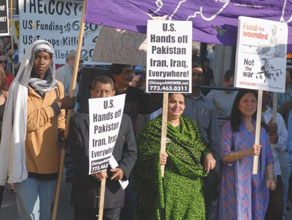 The skewed reading of reality did not cease there. “I am pleased that these two men, elected leaders of Afghanistan and Pakistan, fully appreciate the seriousness of the threat that we face and have reaffirmed their commitment to confronting it,” Obama said. Both leaders listened solemnly so as to reflect the level of their “seriousness.”
The skewed reading of reality did not cease there. “I am pleased that these two men, elected leaders of Afghanistan and Pakistan, fully appreciate the seriousness of the threat that we face and have reaffirmed their commitment to confronting it,” Obama said. Both leaders listened solemnly so as to reflect the level of their “seriousness.”
For a fleeting moment one did in fact hope that Obama would bring with him more than a new language; rather, an entirely new take on U.S. foreign policy. That hope is already in tatters.
“Obama conveyed the right message last week by hosting Afghan President Hamid Karzai and Pakistani President Asif Ali Zardari. The meeting at the White House reflected the close link between Pakistan and the anti-Taliban struggle in Afghanistan. Indeed, nests of Taliban, Al-Qaeda, and other extremists sheltering on the Pakistani side of the border have become a grave threat to Pakistan itself,” opined a Boston Globe editorial. But the Globe also counseled: “As recent events suggest, U.S. military strikes against militants in both countries inevitably provoke anger and indignation among civilians.”
This is as much as most U.S. media — and of course, the U.S. administration — are willing to concede as far as U.S. responsibility in lethal wars, civil strife and militancy in both countries is concerned. In fact, if one is to delineate a major difference in the George W. Bush and Barack Obama administrations regarding Afghanistan, it is the fact that Obama apologizes when the number of innocent civilians killed by U.S. air strikes is too harrowing to ignore. Another notable difference is that he has committed 17,000 additional troops to the already war-devastated country, promising more bloodshed.
“I wish to express my personal regret and certainly the sympathy of our administration on the loss of civilian life in Afghanistan,” Secretary of State Hillary Clinton said in her public apology to the killing of more than100 civilians in two Afghan villages May 4. The apology, however, was obliquely qualified by the U.S. military in comments made by Sergeant Chuck Marsh on May 9: “Reports also indicate that Taliban fighters deliberately forced villagers into houses from which they then attacked ANSF [Afghan National Security Forces] and Coalition forces,” he said.
So, somehow, the U.S. is still not responsible.
Now the war is flaring up in Pakistan. Hundreds of thousands of Pakistani families have fled the area, and the main town of Migora has been virtually emptied of its inhabitants. Reuters reported that, “Pakistani forces attacked Taliban fighters in the Swat Valley with artillery and helicopters after the United States called on the government to show its commitment to fighting militancy.” One has to wonder who is giving the orders in this foolish war, anyway? Moreover, does Obama genuinely think that the Pakistani “Taliban” can be defeated using the exact approach that failed against the Taliban of Afghanistan?
The escalation in Pakistan is not entirely surprising, however, as U.S. officials and media pundits have been adamant in advising the new administration that it was not Afghanistan that posed the greater threat to U.S. interests, but Pakistan. It was similar to the attitude of neo-conservatives in the Bush administration after its failure in Iraq. It was not Iraq that the U.S. should have attacked, but Iran, they tirelessly parroted, hoping to generate yet another war.
What we are not told, however, is that unremitting U.S. bombings of the utterly poor and neglected northern provinces of Pakistan have garnered untold animosity towards the U.S. and its central government allies. It provoked, in some areas, total chaos and lawlessness, which in turn gave rise to the Pakistani “Taliban.” History is repeating itself, but the U.S. administration is taking no notice of the obvious pattern.
A Pakistan writer, Abd Al-Ghafar Aziz, wrote for Al-Jazeera’s Arabic website: “Since the U.S. attack on Afghanistan, the province [of Balochistan] has been accused of supporting terrorism and harboring the leaders of Taliban and Al-Qaeda. Since then, U.S. planes, especially drones, have been striking what it calls ‘precious targets,’ resulting in the death of more than 15,000 people.” Aziz described the people of that region “like orphans without shelter, and without protection.” Naturally, tribal leaders, militant groups and others moved to fill the gap.
If there is one outstanding similarity between the Afghanistan and Pakistan cases it is the fact the U.S. is using the same flawed logic to respond to the most delicate conflicts with bullets, whether those of its own or its allies. If the new administration is keenly interested in reversing the misfortunes of that region, it has to understand the uniqueness of every country and appreciate the untold harm inflicted on civilians by the U.S. and other militaries. Only dialogue and truly respecting the sovereignty of Afghanistan and Pakistan can begin to stabilize the situation.
There are an estimated one million Pakistanis already on the run in the northern and eastern parts of the country. They are threatened by fighting, hunger and all sorts of predators, including U.S. drones circling overhead.
Ramzy Baroud (www.ramzybaroud.net) is an author and editor of PalestineChronicle.com.
[TOP]
